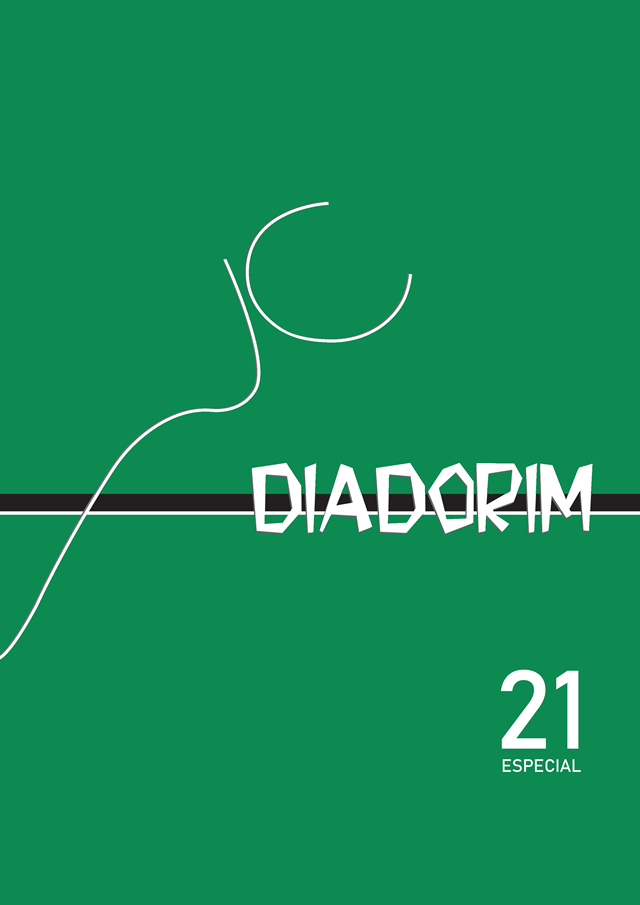The little yellow cap: an inclusive pedagogical proposal
DOI :
https://doi.org/10.35520/diadorim.2019.v21nEspa25518Mots-clés :
Adapted Curriculum. Inclusive Education. Literature. Literacy.Résumé
Literating in a literacy way serves as a basis for all students who are inserted in the school context. In this sense, this study discusses an action research project with a pedagogical practice in a class of the third year of the initial grades of Elementary School. This research-action is justified by its social and cultural nature, which aims to develop practical activities to literate in a literacy way within an inclusive education perspective. Although, there are governmental programs that regulate the literacy process, and the school context shows a reality that reflects precarious rates of literacy in Brazil. This is possibly due to teacher training, school infrastructure and to "non-methods". To literacy without literate, according to Soares (2004), is disconnected from the demands of social practices that everyday demands. In this context, the story "The Little Yellow Cap" was adapted from the perspective of an open curriculum, using diverse curricular proposals directed to the understanding of all the students. The objective was to eliminate any obstacle that could limit the learning and the participation of all students in the educational process.
Téléchargements
Références
ALAO, MJ., SAGBO, G.G., Laleye, A. & Ayivi, B. Aspects Épidémiologiques, Cliniques et Cytogénétiques du Syndrome de Down au Service de Pedriatrie et Génétique Médicale du Centre National Hospitalier et Universitaire de Cotonou, Bénin; À Propos a 20 Cas. Clinics in Mother and Child Health 7, 1-6.
ALMEIDA, Marina S.Rodrigues. Manual Informativo sobre Educação especial. Fonte: Rede Saci, São Paulo.14/06/2012. Disponível em: http://www.sentidos.com.br. Acessado em 11/01/18.
BRASIL, Política Nacional De Educação Especial Na Perspectiva Da Educação Inclusiva. Brasília - Janeiro, 2008.
______. Conselho Nacional de Educação. Diretrizes Curriculares Nacionais para a Educação Especial na Educação Básica. Brasília: CNE/CEB, 2001b.
______. Constituição da República Federativa do Brasil. Promulgada em 05 de outubro de 1988. Rio de Janeiro: Degrau Cultural, 1988.
COLOMER, Teresa. Andar entre livros: a leitura literária na escola. São Paulo: Global, 2007.
FERREIRO, Emília; TEBEROSKY, Ana. Psicogênese da língua escrita. 4ed. Porto Alegre: Artes Médicas, 1991.
GARRIDO LANDÍVAR, Jesus et al. Adaptaciones Curriculares. Guía para los profesores tutores de educación primaria y de Educación Especial. Madrid: Editorial CEPES, S.L, 2002.
GIL, M. (Coord.) Educação Inclusiva: o que o professor tem a ver com isso. Impressa Oficial do Estado de São Paulo, 2005.
GONZÁLEZ, J. A.T. Educação e Diversidade: Bases Didáticas e Organizativas. Trad. Ernani rosa. Porto Alegre: ARTMED, 2002.
KLEIMAN, Angela B. Modelos de letramento e as práticas de alfabetização na escola. In: KLEIMAN, Angela B. (Org.). Os significados do letramento: uma nova perspectiva sobre a prática social da escrita. Campinas: Mercado das Letras, 2008.
MANTOAN, Maria Teresa Égler. Incluindo os excluídos da escola? São Paulo: Moderna, 2000.
OLIVEIRA, E; MACHADO, K. S. Adaptações curriculares: caminho para uma educação inclusiva In: GLAT, R. (org.) Educação Inclusiva: cultura e cotidiano escolar. Rio de Janeiro: 7 Letras, 2007.
PASTOR, G. C. Uma Escuela Comum para Ninos Diferentes: La Integracion Escolar. Barcelona: EUB, 2 ed revisada e atualizada, 1995.
SACRISTÁN, José Gimeno. O currículo:uma reflexão sobre a prática. 3 ed. Porto Alegre. RS. Artmed. 1998.
SOARES, Magda. Alfabetização e letramento. São Paulo: Contexto, 2003.
__________. Letramento e alfabetização: as muitas facetas. Revista Brasileira de Educação, n.25. Jan/Fev/Març/Abr, 2004.
________. Letramento: um tema em três gêneros. 4 ed. Belo Horizonte: Autêntica Editora, 2010. 128 p.
SILVA, Tomaz Tadeu. Documentos de identidade: uma introdução às teorias do currículo. 2.Ed. Belo Horizonte: Autêntica, 2004
TRONCOSO, Maria Victoria e Del Cerro, Maria Mercedes. Síndrome de Down: Leitura e Escrita - Cantabria, Espanha. Masson S.A. - 1998.
Téléchargements
Publié-e
Numéro
Rubrique
Licence
Transferência de direitos autorais - Autorização para publicação
Caso o artigo submetido seja aprovado para publicação, já fica acordado que o autor autoriza a UFRJ a reproduzi-lo e publicá-lo na Diadorim: Revista de Estudos Linguísticos e Literários, entendendo-se os termos "reprodução" e "publicação" conforme definição respectivamente dos incisos VI e I do artigo 5° da Lei 9610/98. O artigo poderá ser acessado pela internet, a título gratuito, para consulta e reprodução de exemplar do artigo para uso próprio de quem a consulta. Essa autorização de publicação não tem limitação de tempo, ficando a UFRJ responsável pela manutenção da identificação do autor do artigo.

A Revista Diadorim utiliza uma Licença Creative Commons Atribuição-NãoComercial 4.0 Internacional (CC BY-NC 4.0).

